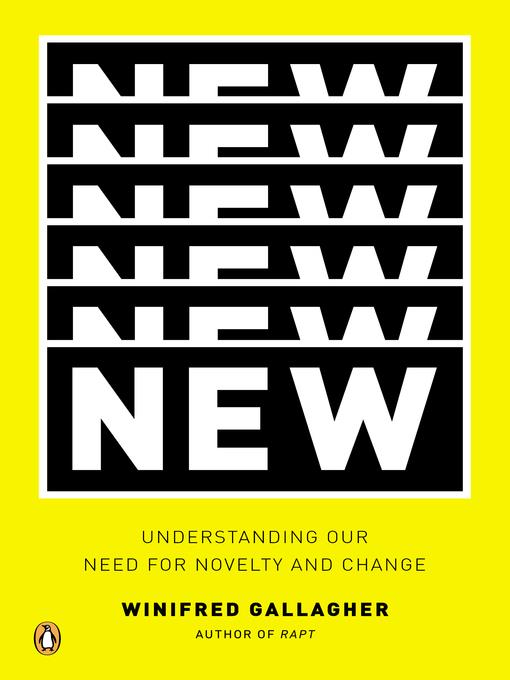
New
Understanding Our Need for Novelty and Change
کتاب های مرتبط
- اطلاعات
- نقد و بررسی
- دیدگاه کاربران
نقد و بررسی

September 12, 2011
Anxiety over newness is at least as hoary as Future Shock, and there’s not much new to say about it, to judge by this scattered social think-piece. Journalist Gallagher (Just the Way You Are) takes a lightly scientific approach. She plumbs the evolutionary advantages of trying new things, warns that the dopamine jolts the brain emits to welcome stimulating novelties make us prey to video games and drug dealers, and classifies everyone according to their genetic and cultural predispositions to approach or avoid unfamiliar phenomena. (She is fascinated with the life stories of “neophiliacs,” such as astronauts, while disdaining “neophobes”—though they have their virtues—as evolutionary dead ends fit to be accountants.) She cannily occupies the sweet spot between celebrating today’s telecom marvels, reality shows, and social networking sites as an unprecedented eruption of creative newness and fretting that the flood of novel entertainments and “junk information” will make us distracted, shallow, and isolated. Gallagher is a fluent writer, and many of her riffs, like a brief history of boredom, sparkle. Still, novelty seeking makes a tenuous principle for analyzing personal and social psychology—is newness more significant now than in the age of Edison and the Wright brothers?—and one that feels old hat.

November 1, 2011
A bright look at our fascination with the new and different. Gallagher (Rapt: Attention and the Focused Life, 2009, etc.) examines how we deal with the ever-increasing amount of novelty and rate of change in our lives. Since the 18th century, when the technology of the Industrial Revolution converged with the ideas of the Enlightenment, the new and novel have played a soaring role in Western society. "We already crunch four times more data--e-mail, tweets, searches, music, video, and traditional media--that we did just 30 years ago," writes the author, "and this deluge shows no signs of slackening." Given our affinity for novelty, we are in danger of becoming so distracted by trivial yet instantly gratifying new things that we no longer focus selectively on the important things that help us adapt to change. We must learn to manage our neophilia, or affinity for novelty. Drawing on studies and interviews with social scientists and others, the author offers evidence that the brain is actually a "novelty-seeking machine" and that about 25 percent of Westerners of European descent have a gene linked to robust novelty seeking. While the author's discussion of our penchant for the gratifying novelty of the most trivial matters will be familiar to many readers, she offers many interesting observations: taking a short break during sex and other pleasurable activities allows you to re-experience the activity's novel delights, and society strongly influences whether neophilia is a vice or a virtue (with early Christianity discouraging an enquiring mind, and the Age of Reason encouraging it). The information age, begun in the 1960s, brought better, easier access to more kinds of data; the digital revolution has taken the novelty boom up a notch, leaving many chronically distracted and less able to engage in deep thought. Gallagher points to the age-old remedy of moderation and notes neophilia will undoubtedly prove valuable in a future where the only certainly is constant change. Engaging and cautionary.
(COPYRIGHT (2011) KIRKUS REVIEWS/NIELSEN BUSINESS MEDIA, INC. ALL RIGHTS RESERVED.)

November 15, 2011
Have you ever wondered why humans, as a species, are so attracted to novel experiences? Gallagher (House Thinking: A Room-by-Room Look at How We Live) brings her talents to the topic of neophilia--the love of novelty. She suggests that, from an evolutionary standpoint, attention to change, interest in new experiences, and adaptability are hallmarks of our species. She also explores individual behaviors concerning novelty and risk-taking and investigates the ways that society and environment affect one's attitude toward novelty. Considering experiences that range from video games to consumer food preferences, this book is an engaging, enjoyable read. The section that treats the complex interaction of nature and nurture as related to neophilia is particularly interesting. VERDICT An accessible, well-researched work that crosses a variety of disciplines and will satisfy scientifically curious readers. It will appeal to those who enjoy Stephen Jay Gould and Oliver Sacks.--Carla H. Lee, Univ. of Virginia Lib., Charlottesville
Copyright 2011 Library Journal, LLC Used with permission.

December 1, 2011
Behavioral-science specialist Gallagher (Rapt: Attention and the Focused Life, 2009)explores our unique affinity for the new or different. The term she uses, neophilia, is generally found in academic circles but comes into its own in her romp through the sciences, art, and pop culture as she shares all sorts of intriguing facts, such as that the reason babies enjoy peekaboo so much is because surprise is a key component in learning. Gallagher looks to physicist Richard Feynman (exemplifying the need for an open attitude toward new experiences), Charles Darwin, and Story Musgrave, an astronaut who has lived a dozen lives already and shows no signs of slowing down. There are discussions of economics, archaeology, and anthropology; psychologists and behaviorists are interviewed; and, in a consideration of boredom, Bleak House and The Yellow Wallpaper, the groundbreaking short story by Charlotte Perkins Gilman, are mentioned. It's difficult to categorize Gallagher's exuberant survey through so many areas of interest, but she proves her point: curiosity about and hunger for the new can certainly take you to many fascinating places.(Reprinted with permission of Booklist, copyright 2011, American Library Association.)

























دیدگاه کاربران